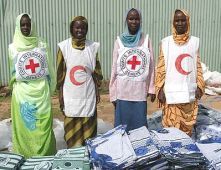ICRC has better access in Darfur but needs remain
July 31, 2007 (GENEVA) — The International Committee of the Red Cross has better access in Sudan’s Darfur region, but general lawlessness still threatens civilians who seek refuge in teeming camps, the outgoing head of its Darfur operations said.

The 35-year-old Swiss spoke in an interview at the ICRC’s headquarters in Geneva after spending a year and a half in Sudan, the agency’s largest humanitarian operation worldwide.
“Over the past three or four months, access in the field has improved. We could move around a little bit more, which was very important before the rainy season,” she told Reuters. “But that doesn’t mean that the general situation has become better.”
There has been a fragmentation and proliferation of armed groups involved in the Darfur conflict, and affected communities have also seen “a high level of criminality and banditry,” said Dessimoz, whose previous post was deputy of operations in Iraq.
“It is the general atmosphere of lawlessness and insecurity that pushes them (civilians) to move. They don’t think it is safe to stay where they are,” she said.
International experts estimate 200,000 people have died and 2.5 million been forced from their homes since conflict erupted in Darfur in 2003 over a rebel revolt. Washington blames the government and its allied militias for the violence, which it calls genocide.
Khartoum rejects that term and puts the death toll at 9,000, blaming Western media for exaggerating the conflict.
FROM ENGINEERS TO WAR SURGEONS
The Swiss-based ICRC is often alone in addressing needs in the vast western region. It deploys 80 expatriates as well as 1,100 Sudanese — ranging from water and sanitation engineers to war surgeons — in the three states.
The ICRC’s strategy is to focus on rural areas to support traditional means of livelihoods, including farming and raising livestock, Dessimoz said. The aim is to enable people to stay in place by providing seeds, tools and clean water.
But this year the ICRC had to take over several major camps, providing basic needs to 160,000 displaced people, after other humanitarian organisations pulled out because of attacks.
“We had to take over, we did not really have any choice but to cover the basic needs of 120,000 people,” she said of Gereida, the largest displaced persons camp in South Darfur.
In three smaller camps near Tawila in North Darfur, it built latrines before the recent onset of the rainy season, which often brings a rise in respiratory and diarrhoeal diseases.
As in all hot spots, the ICRC maintains a neutral approach to the conflict in Darfur and a confidential dialogue with all sides about the basics of international humanitarian law, embodied in the Geneva Conventions on the rules of war.
“It can be the government or rebel group and any other armed group. We try to create a dialogue and bring a change in future behaviour,” Dessimoz said.
“We try to develop an understanding and then make sure the whole (military) hierarchy is aware of what is going on on the ground because at times they don’t know, so that they can take corrective measures which are necessary.”
(Reuters)
